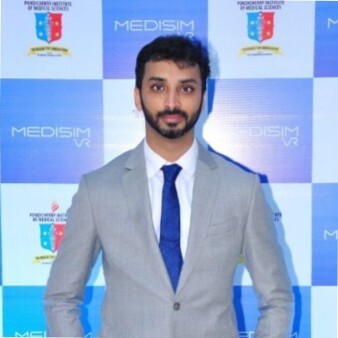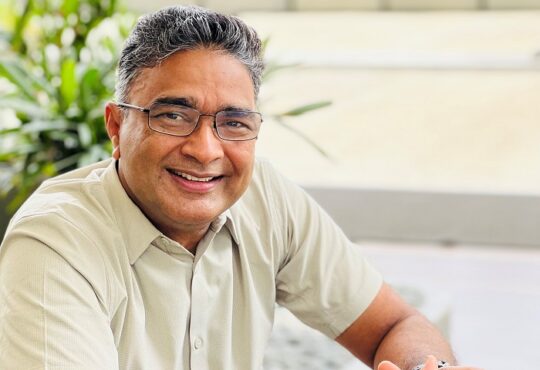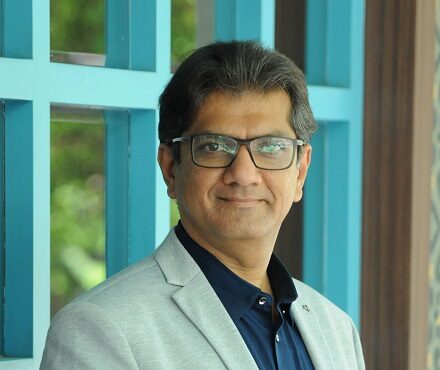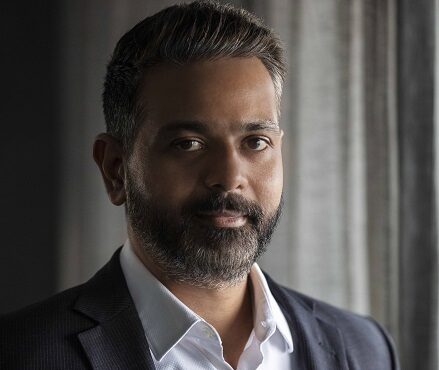
CXOToday has engaged in an exclusive interview with Dr. Adith Chinnaswami, Co-Founder, COO, General Surgeon.
1.The Journey to Becoming COO of MediSim VR:
When I was pursuing my masters and fellowship in minimal access surgery, I noticed that same training methodologies my dad had (also a surgeon) learnt using, was still being utilised across the best institutions in the country. Training standards had not changed over the years. The desire to practice limitlessly and in a safe environment led me to explore simulation- based training solutions. After extensive research and discussions with technology experts, I was introduced to the potential of VR in healthcare by my future cofounders, Sabarish Chandrasekaran and Jeno Manickam Durairaj, who had a decade’s worth of experience in the VR space. Together, we recognized the need for precise and accurate medical simulations, leading to the foundation of MediSim VR. When we began our initial research, we received immense support from IIT Madras. Our conversations with the medical community, also assured us that our skill training product was a solution to a few of the problems they were encountering in training. Our product also caught the eye of Johnson and Johnson innovation labs in Boston, leading to a partnership with them. Our combined efforts and enthusiasm opened many doors, marking the beginning of our journey with MediSim VR.
- Differentiating MediSim VR in the HealthTech Space:
In the crowded HealthTech space, MediSim VR distinguishes itself by focusing on skill training with high fidelity to the medical education process. Our approach is deeply guided by the Objective Structured Clinical Examination (OSCE) checklist, ensuring precision and adherence to medical protocols in every module we develop. Our aim is to reduce the anxiety and stress for budding medical practitioners, offering them immersive training experiences that build their confidence and competence. This focus on high-fidelity simulation and strict adherence to medical protocols sets us apart from others in the HealthTech space.
- The Role of VR in Medical Education and Training:
VR represents a necessary shift in medical education, complementing traditional learning methods with immersive, interactive experiences. By incorporating VR and Haptic technology, students become active participants in their education, engaging in lifelike simulations that enhance their learning experience. This hands-on approach allows them to practice and refine their skills in a safe, controlled environment, preparing them for real- world challenges. MediSim VR is at the forefront of this revolution, using VR to empower future medical practitioners with the confidence and competence they need to excel in their careers.
- Success Stories and Impact of MediSim VR:
One notable success story involves our collaboration with Karpaga Vinayaga Institute of Medical Science, where we first introduced our VR labs. This initiative significantly impacted medical training, with 92% of students embracing the technology. The VR lab facilitated easy memorization of protocols and offered students a powerful tool for mastering their craft. This collaboration not only enhanced the learning experience for medical students but also highlighted the transformative potential of VR in medical education. This collaboration also led us to be recognised at the S3 conference awards 2022 in the Education Research Category for our work titled First Recorded Large-Scale Adoption of Virtual Reality.
- Strategies for Growth and Expansion in Emerging Markets:
MediSim VR’s expansion strategy focuses on building solutions for pan curriculum support. We are building on innovative healthcare solutions including Virtual Patients and Anatomy & Physiology education on our platform. Traditionally, the training systems in healthcare space was designed for low volume cohorts. In emerging markets, we generally have low trainer to trainee ratio. MediSim VR’s initiatives aim to bring immersive learning experiences to emerging markets, where traditional training methods may be less accessible. Our commitment to continuous research and exploration of new technologies underscores our dedication to breaking new ground in medical education.
- Keeping Up with Technological Advancements in VR and AI:
To stay ahead of rapid advancements in VR and AI, MediSim VR fosters a culture of innovation and actively seeks out emerging technologies. Our collaborations with leading experts in VR and AI ensure that we remain at the cutting edge, allowing us to quickly integrate the latest advancements into our platform. Our investment in an AI-powered analytics engine exemplifies our commitment to leveraging technology to enhance learning outcomes. This engine provides detailed insights into student performance, enabling personalized feedback and more effective teaching strategies. Through these efforts, MediSim VR aims to revolutionize medical education, ensuring that future healthcare professionals are well-equipped to meet the challenges of the healthcare
industry.
7.Advice to HealthTech Entrepreneurs:
The road to success for HealthTech begins with identifying the real problem before envisioning the solution. This foundational step ensures that any tech you build genuinely address the needs within healthcare. The merging of technology with healthcare comes with his own complexities. From the very beginning, its important to understand avenues you might need support in and find people to help you. It is imperative to assemble a multidisciplinary founding team to enjoy the entrepreneurial journey together. A robust team combines medical expertise with insights from technology, business, and regulatory perspectives, filling gaps and enhancing your venture’s ability to navigate the HealthTech landscape effectively. Embrace collaboration and be open to external advice, as no one individual can master all aspects of Healthcare and Technology. Engage with stakeholders, from healthcare professionals to patients, to refine your derstanding and approach. Flexibility and adaptability is key; the healthcare sector evolves rapidly, and so must your solutions. Remember, the ultimate aim is not just innovation for its sake but to significantly improve healthcare outcomes.








